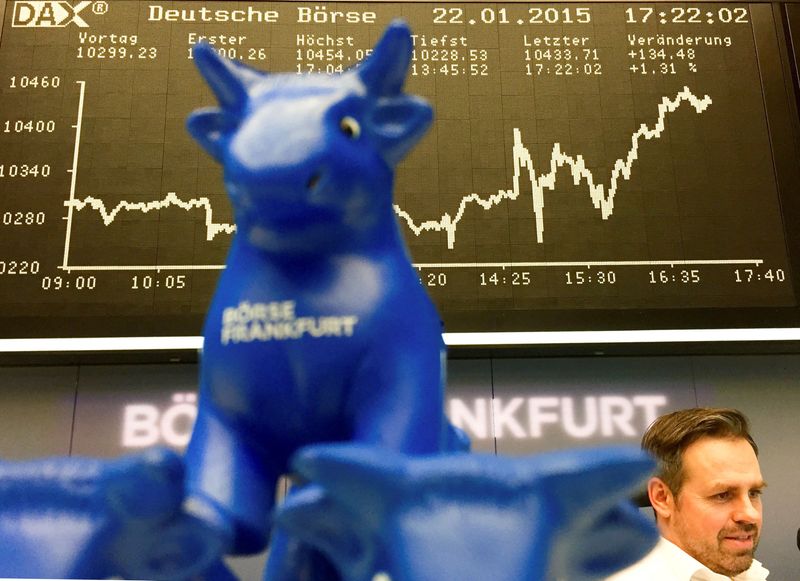Investing.com – European stock markets traded in a mixed fashion Monday, at the start of an action-packed week that includes a US presidential election, interest rate decisions from the Federal Reserve and Bank of England, as well as more quarterly corporate earnings.
At 09:45 ET (14:45 GMT), the DAX index in Germany traded 0.4% lower and the CAC 40 in France fell 0.3%, while the FTSE 100 in the U.K. climbed 0.4%.
US election, central banks in focus
European equities have started the new week on a cautious note, as investors turn their eyes towards Tuesday’s US presidential election.
Early voting was already well underway in what is seen as a very tight race for the White House, pitching Republican Donald Trump against Democrat Kamala Harris, in an election race that will have far-reaching consequences for fiscal policy and global trade.
Also of interest will be the Federal Reserve’s latest policy meeting, which concludes on Thursday.
The market widely expects the policymakers to agree to a rate cut of 25 basis points after Friday’s nonfarm payrolls report showed that jobs growth almost stalled in October amid the impact of strikes and weather disruptions.
Back in Europe, the Bank of England also meets on Thursday, and is also expected to lower rates by 25 bps, after cutting rates for the first time in more than four years in August.
The Swedish Riksbank as well as the Norges Bank, in Norway, also hold policy meetings this week.
Ryanair reports drop in H1 profit
There are more earnings to digest this week in Europe.
The latest quarterly results from firms in the regional Stoxx 600 have been resilient, the BofA strategists led by Andreas Bruckner said in a note to clients on Monday.
They highlighted that 55% of these companies have beaten earnings per share (EPS) estimates, “well above the sub-50% levels implied by deeply negative [Eurozone] economic surprises in the third quarter.”
Banks in Europe have been the major driver of the upside surprises, with almost 90% of these businesses topping analysts’ projections, the analysts said. They added that industrials have also been a “meaningful positive contributor,” thanks in large part to strength at Danish shipping group A.P. Moller-Maersk.
Despite growing at a faster-than-anticipated rate in the third quarter, the Eurozone economy still faces uncertainty around the prospect of heavy tariffs in a potential Trump administration, worsening trade relations with China and sluggish consumer confidence.
On Monday, Ryanair (IR:RYA), Europe’s largest low-cost carrier, reported an 18% year-on-year fall in first-half profit, after average fares fell 10%, but stated that its current quarter bookings looked strong and ticket price weakness was moderating.
Burberry (LON:BRBY) stock soared almost 6% following reports that Moncler (LON:0QII) is considering a bid for the British luxury brand.
EssilorLuxottica (EPA:ESLX) stock rose 3% after reports Meta Platforms (NASDAQ:META) is planning to invest €5 billion ($5.4 billion) to acquire a 4%-5% stake in the eyewear giant.
Schneider Electric (EPA:SCHN) stock fell 2.5% after the company announced a leadership shake-up, with Olivier Blum stepping in as the new CEO, replacing Peter Herweck effective immediately.
Crude prices rise on OPEC+ delay
Oil prices rose strongly Monday after OPEC+, a group of producing nations, delayed a planned output hike in December by at least a month, citing recent pressure on prices from weak demand.
By 09:45 ET, the Brent contract climbed 2.9% to $75.21 per barrel, while U.S. crude futures (WTI) traded 3.1% higher at $71.64 per barrel.
The Organization of Petroleum Exporting Countries and allies, known as OPEC+, announced on Sunday that it will again delay a planned output hike of 180,000 barrels per day by at least a month.
This was the second time it has extended a 2.2 million bpd cut and only goes to show how worried the producing countries are about global demand.
Both contracts had posted weekly declines last week of over 3% as record U.S. output had added to the demand concerns.

